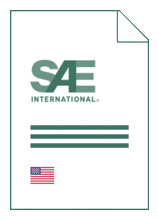Standards Worldwide
Standards Worldwide
Phone +49 30 58885700-07

Standard [CURRENT]
SAE AIR 5720A:2012-08-27
Technical Architecture for Aircraft, Launcher, and Weapon Interoperability (ALWI TA)
- Publication date
- 2012-08-27
- Original language
- English
- Pages
- 33
- Publication date
- 2012-08-27
- Original language
- English
- Pages
- 33
Product information on this site:
Quick delivery via download or delivery service
Buy securely with a credit card or pay upon receipt of invoice
All transactions are encrypted
Short description
This document has been declared "Stabilized" and will no longer be subjected to periodic reviews for currency. Users are responsible for verifying references and continued suitability or technical requirements. New technology may exist. The technical architecture defined in this document outlines mandatory, emerging, and needed standards to provide interoperability at key interfaces in the aircraft/store system (including an associated NATO Network Enabled Capability environment), as required to support a future plug-and-play aircraft/store integration capability. These standards relate to services and protocols associated with the subject interfaces. Modeling standards to facilitate the Model Driven Architecture\sR (MDA\sR) approach to system definition and implementation are also included. Note that the status of referenced standards as reflected in this document is as of August 2007, and document users should check to see if there has been a subsequent change of status relative to applicable standards. The purpose of this document is to define the technical architecture for the NATO Aircraft, Launcher, and Weapon Interoperability - Common Interface (ALWI-CI) environment for aircraft/weapon integration. It was developed by NATO Industrial Advisory Group (NIAG) Subgroup 97 in response to direction from the NAFAG Air Group 2, with technical support from the Society of Automotive Engineers (SAE) Aerospace Avionic Systems Division, to facilitate an interoperable plug-and-play integration capability for aircraft, launchers, and weapons across NATO airpower. The field of application for the ALWI Technical Architecture is NATO aircraft, carriage devices (launchers, carriage devices, etc.), stores (weapons, pods, etc.), and other systems/subsystems which support store employment (communication networks, mission planning systems, etc.)
Loading recommended items...
Loading recommended items...
Loading recommended items...
